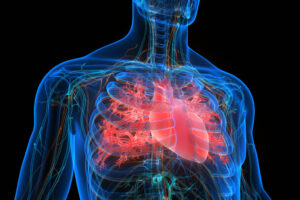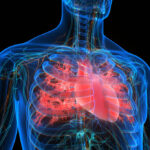Endothelial glycocalyx has been shown to be an integral part of the microvascular system. Without a healthy glycocalyx layer inside the blood vessels and capillaries systems that are required for good health may not function correctly. You may look and feel healthy, but your microvascular system could be in a much different state.
Organ starvation is one reason that declining health and diseases begin in the body. When the capillaries begin to lose their function, vital organs don’t receive the nutrients needed to be healthy… the silent spiral of health decline begins.
Conditions that can be caused by organ starvation and degraded endothelial glycocalyx:
Diabetes – Caused by High Blood Glucose Level
- A healthy microvascular system is important for the transport of glucose from blood to organs.
- High blood glucose damages the microvascular system and causes blindness, kidney failure, heart attack, and stroke.
- High glucose from diabetes can result in capillaries being attacked, resulting in capillaries unable to deliver nutrients like glucose, hormones like insulin, and remove waste from cells.
Heart Disease – Loss of Pump Function of Heart
- Loss of microvascular density causes heart attack.
- An insufficient number of capillaries per heart muscle fiber impairs heart pump function (heart failure).
- A heart attack happens when a blood clot shuts down blood flow in a large artery. When the blood clot is removed blood flow is restored, but damage occurs in the microvessels due to the formation of oxygen radicals.
- Even in the absence of a large vessel blockage, people can experience chest pain (angina) due to inadequate microvascular blood flow and loss of capillaries.
- Many people experience loss of cardiac function and suffer from a type of heart failure that is linked to loss of capillaries and increased stiffness of the heart muscle.
Stroke – Blood Clot in Brain Artery Causing Brain Damage
- Damage to the vascular wall causes blood clots.
- Microvascular damage causes White Matter Lesions with a poor neurological prognosis.
- A stroke occurs when a blood clot in a large artery blocks the supply of oxygen and nutrients, resulting in brain damage. After removal or dissolving the clot and blood flow is restored to the brain, further damage occurs due to loss of capillaries by high levels of oxygen radicals.
Septic Shock – Loss of Circulation Blood Volume Causes Drop in Blood Pressure
- Can lead to Impaired organ blood flow resulting in acute kidney failure, reduced lung function, heart attack, stroke, and brain damage.
- Leaky microvessels result in loss of blood plasma volume to tissue space.
- Damaged vascular wall causes increased blood clotting and inflammation.
Hypertension – Blood Pressure is Higher than Accepted Level
- Hypertension is associated with loss of microvascular density.
- Hypertension increases the cardiovascular risk (heart attack, stroke, kidney failure).
- Hypertension increases the risk of stroke and cardiovascular disease and is associated with capillary loss.
Kidney Disease – Impaired Production of Urine Causing Increased Blood Volume and Hypertension
- Damage of microvessels causes leakage of blood proteins into urinary space, damage of renal filtration units, and kidney failure.
- Breakdown of kidney capillaries causes loss of its filtering system and impairs production of urine, increasing blood volume and resulting in hypertension.
Dementia – Early Cognition Impairment: Neurological Complication
- A healthy microvascular system is essential to maintain an intact neurovascular unit and support normal neurological function.
- Dementia is associated with damage and the loss of capillary density in the brain. When capillaries are damaged, essential nutrients can’t nourish and oxygenate cells in the brain, and just as importantly, waste and carbon dioxide can’t be removed.
Inflammatory Disorders – Rheumatoid Arthritis, Vasculitis, Allergies, Glomerulonephritis, Autoimmune Diseases, Scleroderma, and Atherosclerosis
- Attack on the microvascular system by inflammatory cells results in loss of capillaries.
- Increased capillary permeability causes tissue edema.
- Out-of-control activation of the inflammatory system in response to challenges like rheumatoid arthritis, vasculitis, allergies, glomerulonephritis, autoimmune diseases, scleroderma, and atherosclerosis.
Cancer Metastasis – Uncontrolled Growth of Tumors
- Leaky microvessels allow tumor cells to enter the vascular system and redistribute to different parts of our body, causing tumor metastasis (secondary tumors).
- A leaky microvascular system enables cancer cells to redistribute to different parts of the body.










